Related Research Articles

Confectionery is the art of making confections, or sweet foods. Confections are items that are rich in sugar and carbohydrates although exact definitions are difficult. In general, however, confections are divided into two broad and somewhat overlapping categories: bakers' confections and sugar confections.

York Peppermint Pattie is an American dark chocolate enrobed peppermint confection introduced in 1940 and currently produced by the Hershey Company.
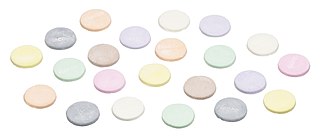
Necco Wafers are a sugar-based candy, sold in rolls of variously-flavored thin disks. First produced in 1847, they became the namesake and core product of the now-defunct New England Confectionery Company (Necco), which operated near Boston, Massachusetts. Production of the candy was suspended in July 2018 when Necco went into bankruptcy, but returned in May 2020 after purchase of the brand and production equipment by the Spangler Candy Company.
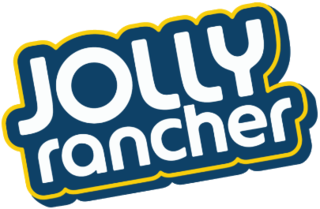
Jolly Rancher is an American brand of sweet hard candy, gummies, jelly beans, lollipops, sour bites, and a line of soda put out by Elizabeth Beverage Company in 2004. Originally created in Colorado in the 1950s, the Jolly Rancher brand has been owned by The Hershey Company since 1996.

Sweethearts are small heart-shaped sugar candies sold around Valentine's Day. Each heart is printed with a message such as "Be Mine", "Kiss Me", "Call Me", "Let's Get Busy", "Miss You", or "I'm Yours". Sweethearts were made by the New England Confectionery Company, or Necco, before being purchased by the Spangler Candy Company in 2018. They were also previously made by the Stark Candy Company. Necco manufactured nearly 8 billion Sweethearts per year. Similar products are available from Brach's and other companies. A similar type of candy is sold in the UK under the name Love Hearts; while similar in formulation to Sweethearts, Love Hearts are round, with the heart design and message embossed on their surface.

Sugar candy is any candy whose primary ingredient is sugar. The main types of sugar candies are hard candies, fondants, caramels, jellies, and nougats. In British English, this broad category of sugar candies is called sweets, and the name candy or sugar-candy is used only for hard candies that are nearly solid sugar.
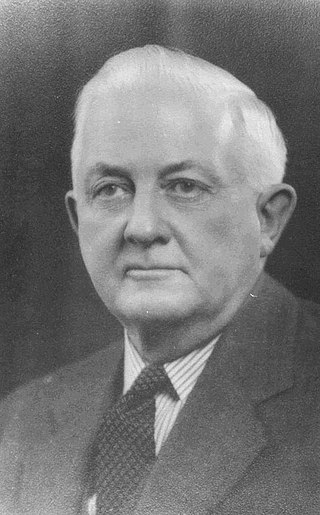
Harry Burnett Reese was an American inventor and businessman known for creating the number one-selling candy brand in the United States; Reese's Peanut Butter Cups, and founding the H. B. Reese Candy Company. In 2009, he was posthumously inducted into the Candy Hall of Fame.

Necco was an American manufacturer of candy created in 1901 as the New England Confectionery Company through the merger of several small confectionery companies located in the Greater Boston area, with ancestral companies dating back to the 1840s.

Sky Bar is an American candy bar introduced by Necco in 1938, discontinued in 2018, and reintroduced in 2019 by the Sky Bar Confectionary Company. Each Sky Bar has four sections, each with a different filling—caramel, vanilla, peanut, and fudge—all covered in milk chocolate.
The Clark Bar is a candy bar consisting of a crispy peanut butter/spun taffy core and coated in milk chocolate. It was introduced in 1917 by David L. Clark and was popular during and after both World Wars. It was the first American "combination" candy bar to achieve nationwide success. Two similar candy bars followed the Clark Bar, the Butterfinger bar (1923) made by the Curtiss Candy Company and the 5th Avenue bar (1936) created by Luden's.

Boyer Candy Company is an American candy company located in Altoona, Pennsylvania. The factory is located in the downtown district. Boyer Candy is privately owned by Consolidated Brands, which is owned by the Forgione family.

Candy Buttons, Candy Dots, or Pox are small rounded flat pegs of candy that are attached to a strip of paper. This classic sugar candy was originally introduced by the Cumberland Valley company and J Sudak and Son of Williamsburg, Brooklyn. In 1977, Sudak, which changed its name to Uncle Nibbles Candy Factory, sold to a repackager in Manhattan named CeeDee Candy, they sold to NECCO. After that acquisition, Necco bought the Cumberland Valley Company in 1980, which made them the exclusive manufacturer of this product in the United States. Each strip of the candy includes three flavors: cherry (pink), lime (blue), and lemon (yellow). Candy Buttons come in two strip sizes: long and short. The long is 221⁄2 inches, while the short is 111⁄4 inches. NECCO made 750 million candy buttons in the course of a year. Following NECCO's 2018 bankruptcy, Candy Buttons were bought at auction by Cincinnati's Doscher's Candies. They were subsequently the first former Necco candy back to market.

Haviland Thin Mints are a chocolate-covered mint candy produced by Log House Foods of Plymouth, Minnesota. The candy is a mint fondant covered in dark chocolate, similar to the York Peppermint Pattie but smaller, thinner and shorter.

Mary Jane is an old-fashioned peanut butter- and molasses-flavored taffy-type candy.

The New England Confectionery Company Factory, also known as the NECCO Candy Factory, is an historic factory complex at 250 Massachusetts Avenue in Cambridge, Massachusetts. The property is now owned by DFS Advisors, and is under long-term lease to Novartis. The complex, which includes the factory building, a power plant, and a modern (2003) parking garage, occupies most of an entire city block bounded by Massachusetts Avenue, Cross Street, Albany Street, and Lansdowne Street. The Moderne-style building was constructed of reinforced concrete, faced predominantly with beige brick and trimmed with limestone. On some facades smooth concrete predominates as the finish surface. The building had a water tower that was painted to resemble a roll of Necco Wafers; during the alterations of the property for use by Novartis, the water tower was retained, and is now painted with a DNA pattern in pastel colors. The building was listed on the National Register of Historic Places in 2005.
The Spangler Candy Company is a privately owned confectioner that has been manufacturing and marketing candy for more than a century. Headquartered in Bryan, Ohio, Spangler's products include lollipops, candy canes, and marshmallow circus peanuts. Spangler brand names include Dum-Dums, Bit-O-Honey, Necco Wafers, Sweetheart Candies, Spangler Candy Canes, Spangler Circus Peanuts and Canada Mints. Dum-Dums, the company's most recognized brand, were invented in 1924, and Spangler purchased the rights and equipment in 1953. The small multicolor lollipops are popular as free giveaways. In 2018, Spangler bought various assets and brands from the defunct Necco, retaining the rights to Necco Wafers, Sweethearts conversation hearts, and Canada Mints. In 2020, Spangler bought the rights to Bit-O-Honey from Pearson Candy Company.
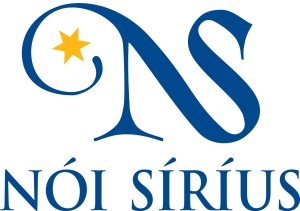
Nói Síríus is an Icelandic chocolate and confection manufacturer founded in 1920. The company is a wholly-owned subsidiary of the Norwegian Orkla conglomerate. Hallgrímur Benediktsson took over as main owner in the 1920s, and his grandson, Finnur Geirsson, was the company's president up until late 2021 when Lasse Ruud-Hansen took over after Orkla had Bought the rest of the shares in early 2021. Nói Síríus is Iceland's biggest candy producer and its candies have been a traditional part of camping trips since 1933, along with stockfish.
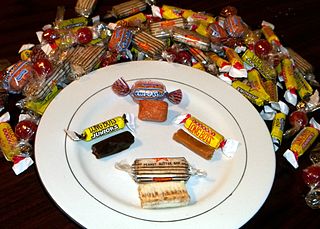
The Atkinson Candy Company is a candy company based in Lufkin, Texas, best known for producing the Chick-O-Stick.

Candy Raisins were a soft jujube candy popular in Milwaukee, Wisconsin, United States. The candy was produced from the 1930s until 2008, discontinued, then revived in 2014. They were discontinued again October 22, 2023.
References
- 1 2 "No love for candy maker, Stark Candy to close plant". The Journal Times. AP. March 7, 2008. Retrieved 2 April 2018.
- 1 2 3 Hartel, Richard W.; Hartel, AnnaKate (March 29, 2014). Candy Bites: The Science of Sweets. Springer Science & Business Media. p. 256. ISBN 9781461493839.
- 1 2 3 Smith, Andrew F. (2007). The Oxford Companion to American Food and Drink. Oxford University Press. p. 413. ISBN 978-0195307962.
- ↑ "Necco to close Stark Candy plant". candyindustry.com. March 20, 2008. Retrieved 2 April 2018.